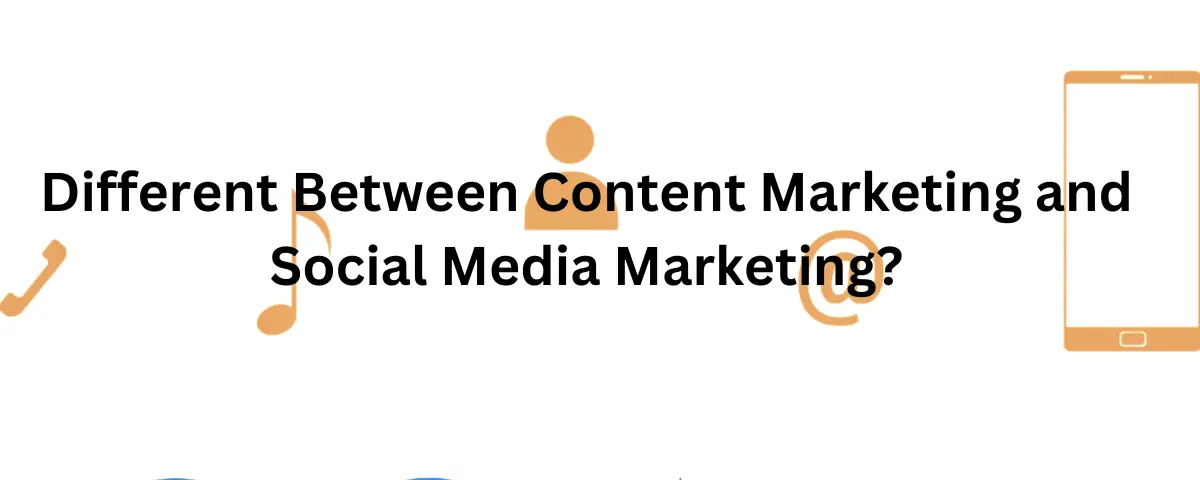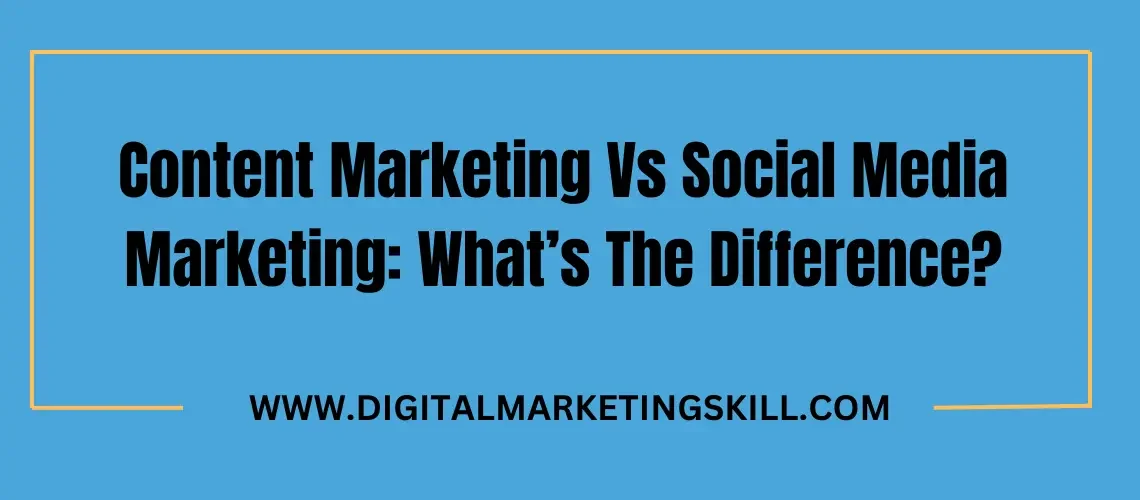As a marketing newbie or a marketer expert in the digital space, you’ve likely heard the terms “content marketing” vs “social media marketing” thrown around frequently. But what exactly do they mean, and how do they differ?
Understanding the distinctions between these two powerful marketing approaches is crucial for developing effective strategies that appeal to your target audience.
Content marketing focuses on creating and distributing valuable, relevant, and consistent content to attract and retain your desired audience.
On the other hand, social media marketing leverages popular online platforms to connect with your customers, build relationships, and promote your brand’s offerings.
In this post, we’ll break down the key differences between content marketing and social media marketing, the benefits and the strategy to implement.
Get 50% Discount to Master ALL Aspects of Digital Marketing That Can Earn You $2,500 - $5,000 a month (Even if you are a complete beginner!)
Our students that intentionally implement what they learn from our digital marketing course make back the entire course fee within a single month or more after completing our course because our course gives them many income generating options with unlimited earning potential with no age or location barrier. The best part is no technical skills are required.
An opportunity to change your lifestyle and make money working from anywhere in the world. The results our students get from our digital marketing course prove this could be applied to any market or country and that it is designed for any skill level and work background.
*By signing up, you agree to our privacy policy and terms of service.
By the end, you’ll clearly understand when to utilize each approach and how to integrate them for maximum impact on your marketing efforts seamlessly.
You can also take a Digital Marketing course from Digital Marketing Skill Instiute (DMSI) to get started.
What is Content Marketing

Content marketing is a strategy that focuses on creating and distributing valuable, relevant, and consistent content to attract and retain a clearly defined audience and to drive profitable customer action.
It helps to build relationships and trust with potential customers, making it easier to sell products faster. This approach helps businesses build trust with their prospects and customers.
According to Statista – Data suggests that content marketing revenue amounted to 63 billion U.S. dollars in 2022, and according to the latest forecasts, the content market industry is set to reach 107 billion U.S. dollars by 2026.
To execute a successful content strategy, businesses must understand their audience, create relevant content, and distribute it effectively. It attracts people to a brand, and once a person becomes interested in the topic, they become acquainted with the brand’s voice.
As a content marketer, you should understand the value of creating compelling, relevant content to engage and inform your audience. You can enrol in our digital marketing course to learn more about content marketing to lead your campaign.
You can create different types of content, depending on the audience that you want to reach:
- Blog post
- Articles
- eBooks
- How-to guides
- Infographics
- Case studies
- Newsletter
- Whitepapers
- Podcast
By using a mix of these different types of content, businesses can reach a broader audience and create multiple touchpoints for their brand.
Common content marketing goals include driving audience members through the sales funnel, from awareness to the point of purchase and onward into brand advocacy, as well as boosting metrics like time to close new leads and lead-to-customer conversion.
To achieve these goals, businesses should align their content strategy with their overall business objectives and measure their marketing success regularly.
What is Social Media Marketing

Social media marketing is the process of creating content for social media platforms to promote your products and/or services, build community and engagement with your target audience, and drive traffic to your business.
To create an effective social media marketing strategy, it’s important to identify campaign goals and objectives, choose the right social media platforms for your business, create and publish engaging content, and monitor and analyze social media metrics to optimize future performance.
Social media marketing can help increase brand awareness, generate leads, boost conversions, and improve customer service. According to Synup, 76% of local businesses use social media as part of their marketing strategy, while 41% of them rely on social media to help drive revenue.
Different types of social media content include:
- Images
- Video
- Text-based posts
- Short form content (stories/reels)
- Live video
Social media platforms like Facebook, LinkedIn, and Twitter are used to connect directly with customers, share content, organize events, run targeted ads, and engage with the audience through direct messaging tools.
Social media marketers should specialise in using different social media platforms to promote a company’s offerings and grow their social media usage for individuals and businesses continues to increase.
Different Between Content Marketing and Social Media Marketing?

1. Main Objectives
Content Marketing: The primary objective of content marketing is to attract and retain a clearly defined audience by providing valuable, relevant content consistently. It aims to educate, inform, and engage with the audience to build trust and credibility over time.
Social Media Marketing: Social media marketing focuses on increasing brand engagement and loyalty by fostering direct customer interactions, building relationships, and enhancing brand visibility through social platforms.
2. Delivery Mechanism
Content Marketing: Primarily involves the creation and distribution of content through various channels like websites, blogs, videos, infographics, and more. It aims to attract and retain audiences by providing valuable information.
Social Media Marketing: Utilizes social media platforms to distribute content, extend its reach, and engage directly with customers. It enables brands to interact with consumers in real time and build relationships through conversations.
3. Goals
Content Marketing: Focuses on driving traffic to a brand’s site, educating consumers, establishing thought leadership, and influencing customer behavior through valuable and informative content.
Social Media Marketing: Aim to increase brand engagement and loyalty by creating a caring, customer-centric image, fostering direct interactions with customers, and using social platforms for customer support, feedback, and relationship-building.
4. Cost Considerations
Content Marketing: While content creation can incur costs, such as hiring writers (Accredital) designers, or tools, the long-term benefits often outweigh the initial investment. Content marketing focuses on creating valuable assets that can be repurposed and reused over time, providing ongoing value.
Social Media Marketing: Social media marketing can involve costs related to advertising, sponsored posts, or social media management tools. The immediate impact and reach of social media campaigns may require a more consistent budget allocation compared to content marketing.
At Digital Marketing Skill Instiute (DMSI) our courses cover in-depth knowledge and skills about various niches of digital marketing that you can use for your marketing activities.
Content marketing vs Social media marketing: How to use each
Content Marketing
Use for:
- Building trust and credibility with your audience
- Establishing your brand as a thought leader
- Generating leads and driving conversions
- Creating long-term value and SEO benefits
Effective for:
- In-depth guides and tutorials
- Blog posts and articles
- E-books and whitepapers
- Webinars and video content
Social Media Marketing
Use for:
- Building brand awareness and reach
- Engaging with your audience and community
- Sharing quick updates and news
- Driving website traffic and conversions
Effective for:
- Short-form content and snippets
- Visual content like images and videos
- Real-time engagement and customer service
- Paid advertising and promotions
Which Marketing Strategy Should I Use?
An integrated marketing strategy combines social media and content marketing for optimal results. While they serve distinct purposes, they are interdependent and should be used together for maximum impact.
Content is the foundation of the message, while social media serves as a modern-day distribution channel. When used together, they complement each other’s strengths and weaknesses.
Social media without strong content lacks substance and credibility, while content without social media may not reach its full potential.
By understanding their respective roles and how they support one another, businesses can align their efforts and make the most of their marketing efforts.
This integrated approach allows for a more comprehensive and effective marketing strategy, leveraging the power of both social media and content marketing.
Learn Content Marketing and Social Media Marketing
You can master and learn various digital marketing skills like content marketing and social media marketing from the Digital Marketing Skill Institute! They offer Professional Diploma Program and Master Diploma Program to help you stay current and relevant in the industry. Join their marketing programs to learn the latest marketing techniques, upskill yourself, and become a valuable asset in the digital marketing world.
Final Thought
While content marketing and social media marketing are different approaches, they work best when used together. Content marketing helps you create valuable, educational material that attracts your target audience and builds trust in your brand. Social media marketing allows you to share awesome content and engage directly with your followers.
At the end of the day, both content and social media marketing are all about connecting with your audience in a meaningful way. When you understand their unique strengths, you can develop a well-rounded digital marketing plan that captures attention, provides value, and ultimately drives results for your business.
FAQs
How do content marketing and social media work together?
Content marketing and social media marketing work together synergistically to enhance a brand’s online presence and engagement with its audience. Content marketing involves creating valuable, relevant content to attract and retain customers, while social media marketing focuses on using social platforms to interact with consumers directly.
Does a social media manager create content?
Yes, a social media manager often creates content as part of their role. Social media managers are responsible for developing engaging and relevant content for social media platforms, including posts, images, videos, and other media. They craft content that aligns with the brand’s voice, engages the target audience, and drives interactions on social media.
Which type of digital marketing is best?
The effectiveness of different types of digital marketing depends on the specific goals and needs of a business. Content marketing, social media marketing, search engine optimization (SEO), email marketing, pay-per-click advertising (PPC), and influencer marketing are all valuable digital marketing strategies that can yield positive results when implemented correctly. The best type of digital marketing for a business will depend on factors such as target audience, industry, budget, and marketing objectives.
Related articles
What is Omnichannel Marketing? Definition + Strategy
What is a Digital Marketing Strategist and How to Become One


